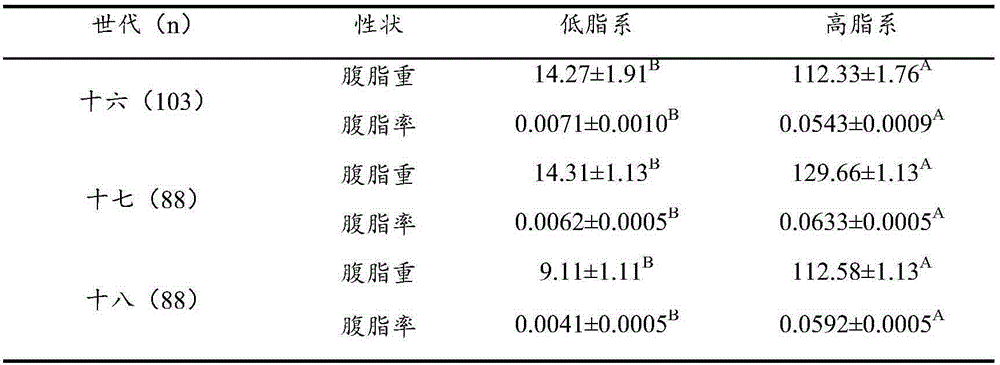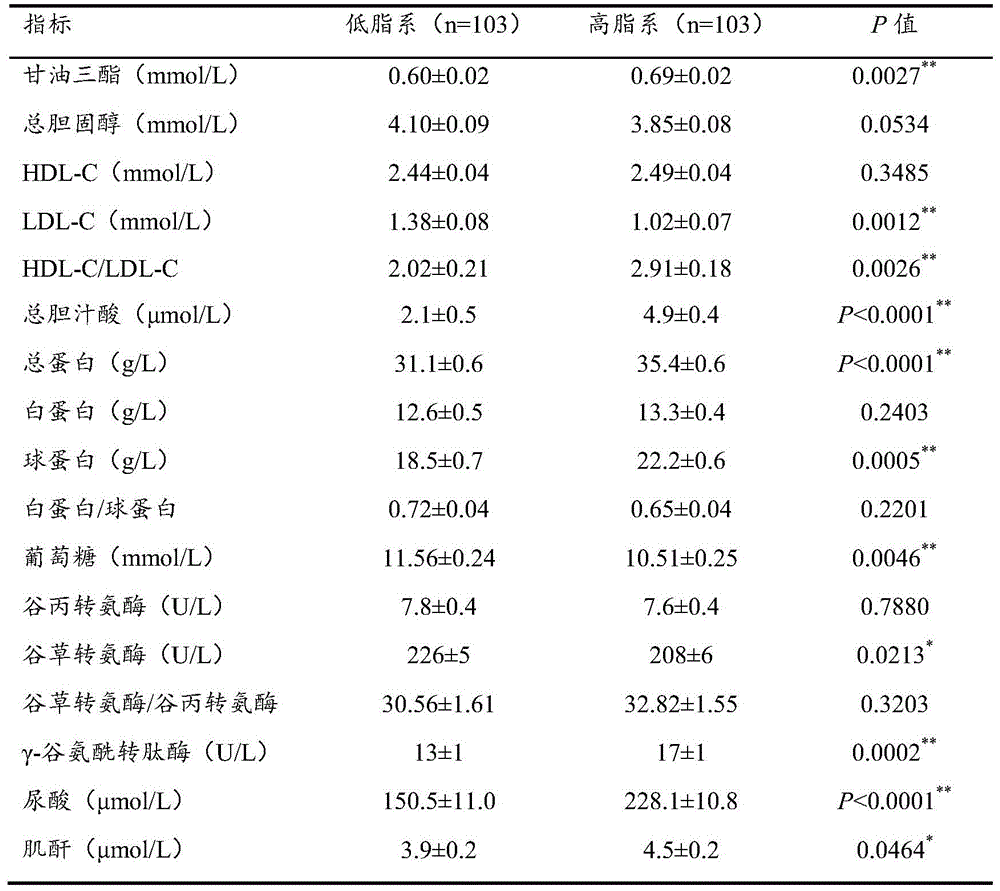A Serum Biochemical Marker for Assisted Screening of Low-fat Broilers and Its Application
A biochemical index and serum technology, applied in the field of avian genetics and breeding, can solve the problems of long time and poor selection effect, and achieve the effect of high heritability and stable inheritance
- Summary
- Abstract
- Description
- Claims
- Application Information
AI Technical Summary
Problems solved by technology
Method used
Image
Examples
Embodiment 1
[0025] 1. Experimental materials
[0026] 1. Experimental Animals and Determination of Traits
[0027] The 16th, 17th and 18th generation cocks of broiler high-fat and low-fat two-way selection lines bred by Northeast Agricultural University were used as the experimental groups. At the age of 7 weeks, after fasting for 12 hours, the live weight of broilers was measured before slaughter, and the abdominal fat weight was measured after slaughter, and the abdominal fat rate was calculated by dividing by the live weight at 7 weeks old. Carotid artery blood was collected and placed in a 5ml centrifuge tube (without adding anticoagulant), the blood sample was centrifuged at 3000r / min for 15min to obtain serum, put into an EP tube, and stored in a -20°C refrigerator for later use.
[0028] 2. Drugs and enzymes
[0029] Triglyceride detection kit; total cholesterol detection kit; high-density lipoprotein cholesterol detection kit; low-density lipoprotein cholesterol detection kit; t...
Embodiment 2
[0045] Example 2 Comparison of Chicken Serum Biochemical Indexes Between High and Low Fat Two-way Selection Line Broilers
[0046] The 16th, 17th and 18th generation broiler chickens of the high-fat and low-fat two-way selection line selected by Northeast Agricultural University were used as experimental materials to compare the body fat traits of high-fat and low-fat broiler chickens in each generation analyze. The results showed that in the three generations, the abdominal fat weight and abdominal fat rate of high-fat broiler chickens were significantly higher than those of low-fat broiler chickens (P<0.01) (Table 1).
[0047] Table 1 Comparison of body fat traits between the sixteenth, seventeenth and eighteenth generations of high-fat and low-fat broiler chickens
[0048]
[0049] Note: A and B are in the same row, indicating that there is a significant difference between high-fat and low-fat broilers (P<0.01)
[0050]Using the sixteenth, seventeenth and eighteenth ge...
Embodiment 3
[0061] The genetic parameter estimation of embodiment 3 serum indexes
[0062] The serum biochemical indicators of the three generations obtained in Example 2 are put together to estimate genetic parameters, and the results show that serum albumin / globulin (h 2 =0.89) and high-density lipoprotein cholesterol / low-density lipoprotein cholesterol (h 2 =0.86) the highest heritability, followed by serum total bile acid, low-density lipoprotein cholesterol and albumin (0.582 2 2 <0.18) (Table 5).
[0063] Serum HDL-C / LDL-C, HDL-C, and glucose concentrations were positively associated with higher abdominal fat traits (r g )(0.30g g p )(-0.29p <0.28) (Table 5).
[0064] Table 5 Heritability of serum biochemical indicators, genetic and epigenetic correlations between serum biochemical indicators and body fat traits
[0065]
[0066] Note: HDL-C high-density lipoprotein cholesterol; LDL-C low-density lipoprotein cholesterol.
PUM
 Login to View More
Login to View More Abstract
Description
Claims
Application Information
 Login to View More
Login to View More - R&D
- Intellectual Property
- Life Sciences
- Materials
- Tech Scout
- Unparalleled Data Quality
- Higher Quality Content
- 60% Fewer Hallucinations
Browse by: Latest US Patents, China's latest patents, Technical Efficacy Thesaurus, Application Domain, Technology Topic, Popular Technical Reports.
© 2025 PatSnap. All rights reserved.Legal|Privacy policy|Modern Slavery Act Transparency Statement|Sitemap|About US| Contact US: help@patsnap.com



